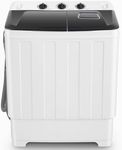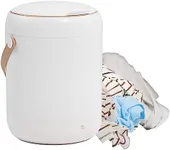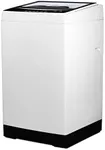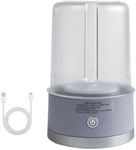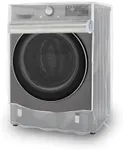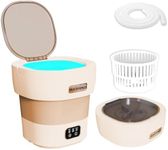Buying Guide for the Best Large Washing Machines
Choosing the right large washing machine can make a significant difference in your laundry routine. It's important to consider various factors to ensure you get a machine that meets your needs and fits your lifestyle. Here are some key specifications to consider when selecting a large washing machine, along with explanations to help you understand their importance and how to choose the best one for you.CapacityCapacity refers to the amount of laundry a washing machine can handle in one load, usually measured in kilograms. This is important because it determines how much laundry you can wash at once. For large families or households that generate a lot of laundry, a higher capacity (10kg or more) is ideal. For smaller households or those with less frequent laundry needs, a capacity of 7-9kg may suffice. Consider your laundry habits and the size of your household when choosing the right capacity.
Spin SpeedSpin speed is measured in revolutions per minute (RPM) and indicates how fast the drum spins to remove water from your clothes. Higher spin speeds (1200-1600 RPM) are better for heavier fabrics like towels and jeans, as they extract more water, reducing drying time. Lower spin speeds (800-1000 RPM) are gentler on delicate fabrics. Choose a washing machine with adjustable spin speeds to cater to different types of laundry.
Energy EfficiencyEnergy efficiency is rated using a scale from A+++ to D, with A+++ being the most efficient. This spec is important because it affects your electricity consumption and environmental impact. Higher efficiency models use less water and electricity, saving you money on utility bills. Look for machines with an A+++ rating for the best energy savings, especially if you do frequent laundry.
Wash ProgramsWash programs are preset settings that adjust the wash cycle for different types of fabrics and soil levels. This is important for ensuring your clothes are cleaned effectively without damage. Common programs include cotton, synthetics, delicates, and quick wash. Some machines offer specialized programs for items like sportswear, baby clothes, or bedding. Consider your typical laundry load and look for a machine with programs that match your needs.
Noise LevelNoise level is measured in decibels (dB) and indicates how loud the washing machine is during operation. This is important if your laundry area is near living spaces or if you prefer a quieter environment. Machines with noise levels below 50 dB are considered very quiet, while those above 70 dB can be quite loud. If noise is a concern, look for models with lower decibel ratings or features like quiet mode.
Build Quality and DurabilityBuild quality and durability refer to the materials and construction of the washing machine. This is important for ensuring the machine lasts longer and withstands frequent use. Look for machines with stainless steel drums, which are more durable and resistant to rust compared to plastic drums. Also, consider brands with a reputation for reliability and good customer service. Reading reviews and checking warranty terms can help you gauge the build quality.
Smart FeaturesSmart features include connectivity options like Wi-Fi, allowing you to control and monitor your washing machine via a smartphone app. This is important for convenience and efficiency, as you can start, stop, or schedule cycles remotely. Some machines also offer diagnostic tools to troubleshoot issues. If you value technology and convenience, look for models with smart features that integrate with your home network.

